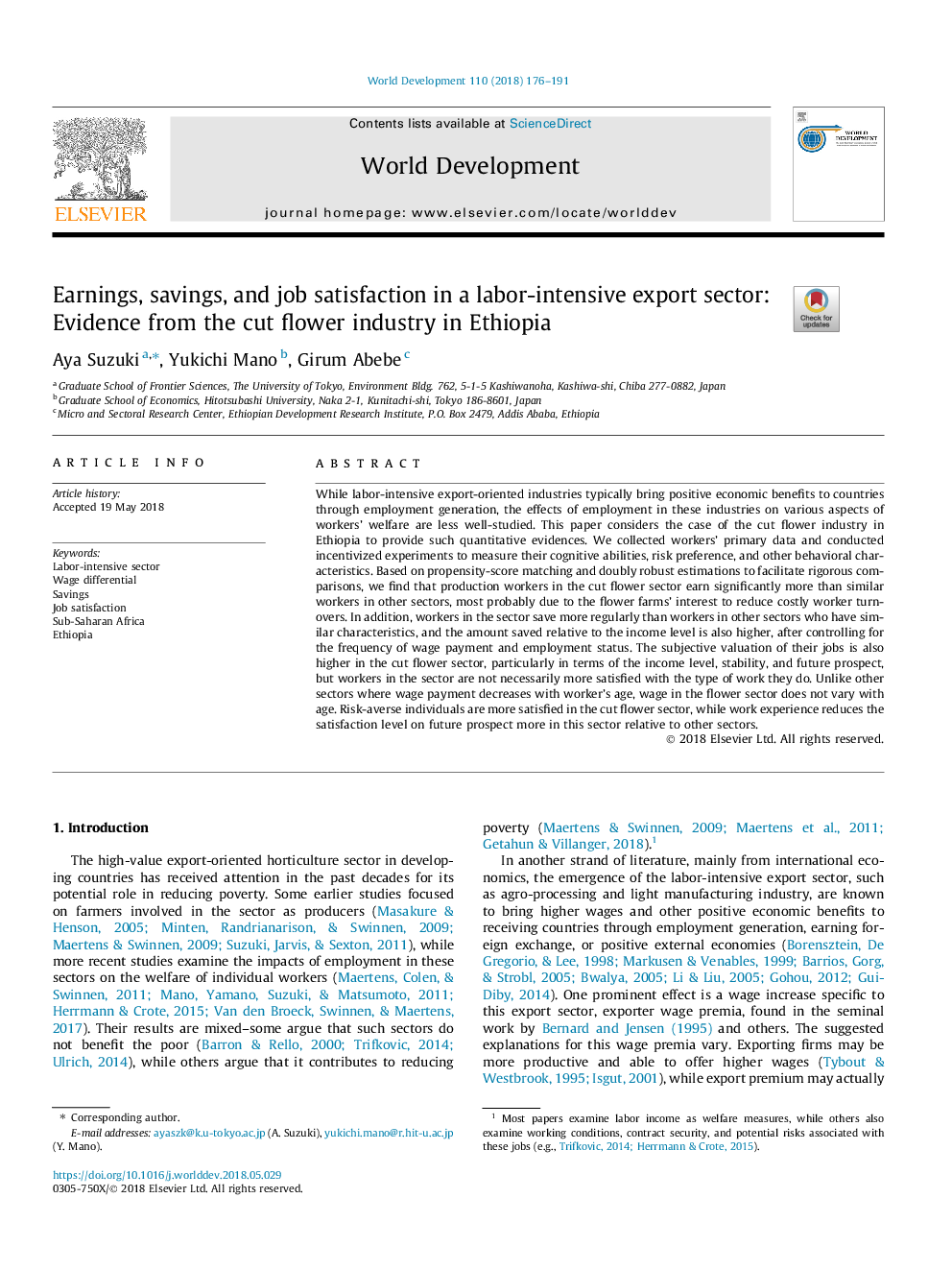| کد مقاله | کد نشریه | سال انتشار | مقاله انگلیسی | نسخه تمام متن |
|---|---|---|---|---|
| 7391342 | 1481108 | 2018 | 16 صفحه PDF | دانلود رایگان |
عنوان انگلیسی مقاله ISI
Earnings, savings, and job satisfaction in a labor-intensive export sector: Evidence from the cut flower industry in Ethiopia
ترجمه فارسی عنوان
درآمد، پس انداز و رضایت شغلی در یک بخش صادرات شغلی: شواهدی از صنعت گل صنوبر در اتیوپی
دانلود مقاله + سفارش ترجمه
دانلود مقاله ISI انگلیسی
رایگان برای ایرانیان
کلمات کلیدی
بخش کار فشرده، دیفرانسیل دستمزد، پس انداز، رضایت شغلی، جنوب صحرای آفریقا، اتیوپی،
ترجمه چکیده
با وجودی که صنایع با شدت متمرکز بر صادرات به طور معمول از طریق ایجاد اشتغال به کشورها مزایای مثبت اقتصادی می دهد، تأثیر اشتغال در این صنایع بر جنبه های مختلف رفاه کارگران کمتر مورد مطالعه قرار می گیرد. این مقاله در مورد صنایع گل برش در اتیوپی به منظور ارائه چنین ادعاهای کمی در نظر گرفته شده است. ما داده های اولیه کارگران را جمع آوری کردیم و آزمایش های انگیزشی برای اندازه گیری توانایی های شناختی، ریسک پذیری و سایر ویژگی های رفتاری انجام دادیم. بر اساس گرایش تساوی و برآوردهای دوگانه ای برای تسهیل مقایسه های دقیق، ما دریافتیم که کارگران تولیدی در بخش گل بریده به میزان قابل توجهی بیشتر از کارگران مشابه در بخش های دیگر، به احتمال زیاد به دلیل علاقه مندان به گل برای کاهش هزینه های کارکنان، درآمد کسب می کنند. افزون بر این، کارکنان در بخش به طور منظم تر از کارگران در بخش های دیگر که ویژگی های مشابه دارند، صرفه جویی می کنند و پس از کنترل فرکانس پرداخت دستمزد و وضعیت اشتغال، مقدار ذخیره شده نسبت به سطح درآمد نیز بالاتر است. ارزیابی ذهنی مشاغل خود نیز در بخش گل بریده شده است، به ویژه از نظر میزان درآمد، ثبات و چشم انداز آینده، اما کارگران در این بخش لزوما بیشتر از نوع کار آنها راضی نیستند. بر خلاف سایر بخش هایی که درآمد دستمزد با سن کارگر کاهش می یابد، دستمزد در بخش گل با سن متفاوت نیست. افراد مبتلا به ریسک پذیری در بخش گل بریده بیشتر راضی هستند، در حالی که تجربه کار باعث کاهش سطح رضایتمندی در چشم انداز آینده در این بخش نسبت به سایر بخش ها می شود.
موضوعات مرتبط
علوم انسانی و اجتماعی
اقتصاد، اقتصادسنجی و امور مالی
اقتصاد و اقتصادسنجی
چکیده انگلیسی
While labor-intensive export-oriented industries typically bring positive economic benefits to countries through employment generation, the effects of employment in these industries on various aspects of workers' welfare are less well-studied. This paper considers the case of the cut flower industry in Ethiopia to provide such quantitative evidences. We collected workers' primary data and conducted incentivized experiments to measure their cognitive abilities, risk preference, and other behavioral characteristics. Based on propensity-score matching and doubly robust estimations to facilitate rigorous comparisons, we find that production workers in the cut flower sector earn significantly more than similar workers in other sectors, most probably due to the flower farms' interest to reduce costly worker turnovers. In addition, workers in the sector save more regularly than workers in other sectors who have similar characteristics, and the amount saved relative to the income level is also higher, after controlling for the frequency of wage payment and employment status. The subjective valuation of their jobs is also higher in the cut flower sector, particularly in terms of the income level, stability, and future prospect, but workers in the sector are not necessarily more satisfied with the type of work they do. Unlike other sectors where wage payment decreases with worker's age, wage in the flower sector does not vary with age. Risk-averse individuals are more satisfied in the cut flower sector, while work experience reduces the satisfaction level on future prospect more in this sector relative to other sectors.
ناشر
Database: Elsevier - ScienceDirect (ساینس دایرکت)
Journal: World Development - Volume 110, October 2018, Pages 176-191
Journal: World Development - Volume 110, October 2018, Pages 176-191
نویسندگان
Aya Suzuki, Yukichi Mano, Girum Abebe,
